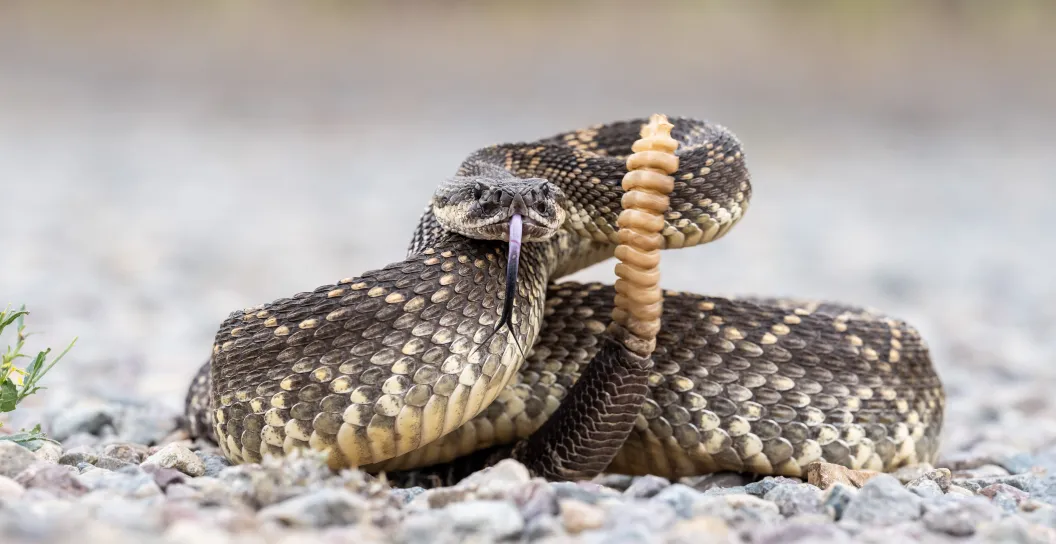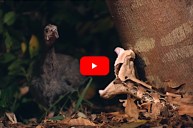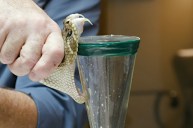While it is safe to assume that none of us want to be bitten by a snake, it is always good to know how to handle the situation. There are some very clear do's and do not's when it comes to handling a snake bite, particularly if that snake happens to be venomous. In this article, we drop all of the Hollywood pretenses shown to us in movies, and we share what you should do if a snake bites you. As well as reveal the worst thing you can do if you're bitten by a snake.
Suffering A Snake Bite, What To Do

Photo by David McNew/Getty Images
Before we cover the worst thing you can do if you're bitten by a snake, we should cover the things you SHOULD do. First, while not all snakes are venomous, many are. Wildlife SOS states, "Snake venom is classified into three categories: Neurotoxic, Hemotoix & Cytotoxic venom." Each type of venom affects the body differently. "Neurotoxic venom impacts the nervous system and the brain, whereas Hemotoxic venom affects the cardiovascular system, disrupts blood clotting, and/or causes organ degeneration and generalized tissue damage. Cytotoxic venom works on a molecular level by destroying the cell tissue, leading to extreme pain."
If bitten by a snake, it is best to act as if it is venomous no matter what. That way, you can ensure you get the proper care. Better safe than sorry, the saying goes. Being prepared for a snake bite can help lessen the chance that you suffer some of the more serious consequences, such as paralysis, internal bleeding, organ failure, or even death.
Here are things you should do if a snake bites you:
- Seek medical attention immediately. Go to the nearest hospital; they will most likely have the anti-venom you need.
- Apply a bandage to the area of the bite, not too tightly.
- Avoid unnecessary or sharp movements; you want to limit mobility in the area of the bite as much as possible.
- Stay calm
Suffering A Snake Bite, What NOT To Do

G Parekh via Getty Images
According to How to Survive, there are "2.7 million venomous snake bites globally" yearly. With that many bites, you'd assume people know how to handle these situations. However, most people have the wrong idea about handling being bitten by a snake. Many common assumptions about surviving a snake bite prove to be incorrect and often fatal.
For example, contrary to many famous Hollywood films, you should not try sucking the venom out of the wound. While it may seem like a good idea, sucking the venom out before it reaches your heart, it actually puts you at greater risk. First, because your mouth contains a lot of bacteria that could infect the wound. Also, when you are sucking the venom out, you cause the blood to flow faster. This, in turn, increases the speed at which the venom spreads through your body and reaches your heart.
The List Continues...
Besides not sucking the venom out, there are other things on the do not do list after being bitten by a snake. Most of them may shock you. For example, How to Survive says you should not make a tourniquet around the wound. While helpful for other wounds, the tourniquet will trap the vemon and concentrate it in the bite area. Although that may sound like a good thing, it increases the chance of needing to amputate the limb.
Another thing that makes it one of the worst things to do after being bitten by a snake list is waiting for symptoms. Each snake bite is different. Do not make the mistake of thinking that because you do not feel symptoms immediately, you are not in danger. Within 30-60 minutes, you may experience dizziness, blurred vision, or burning of the skin. However, if you waited half an hour to an hour before seeking medical attention, you have a much higher chance of death.
The Worst Thing To Do After A Snake Bite
Now, the moment you have all been waiting for. What is the WORST THING you can do after being bitten by a snake? Raising your limbs. This is often the first thing people think to do, but it is deadly. How to Survive explains why that is.
"After the snake's fangs pierce your limbs, the venom will enter your bloodstream and start to travel." Gravity is your friend here. By keeping the bite site below heart level, you make it more difficult for the venom to spread there. That is because the venom would then have to travel upward, against gravity, to reach the heart. By keeping the bite site beneath the heart, you are also helping to slow the spread of the venom, which gives you more time to find help. By raising your limbs, you are allowing the venom to pass through your bloodstream and to your heart quickly.
This is perhaps the worst thing you could do when bitten by a snake, not only because of its deadly effects but because of the misconception surrounding it. Often, when people are hurt, they raise that body part. DO NOT DO THAT in this situation; it could be the difference between life and death.




